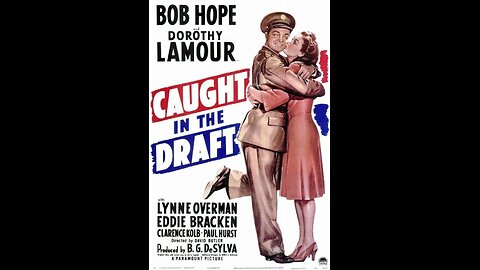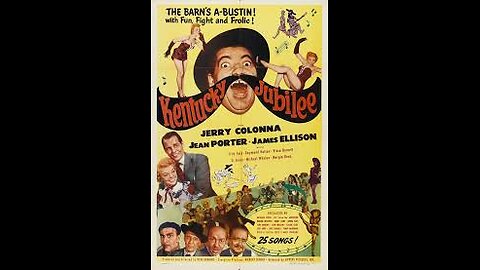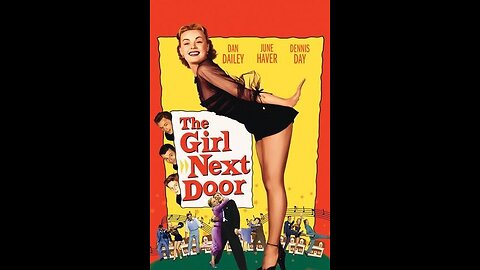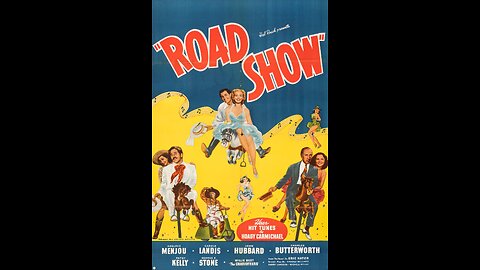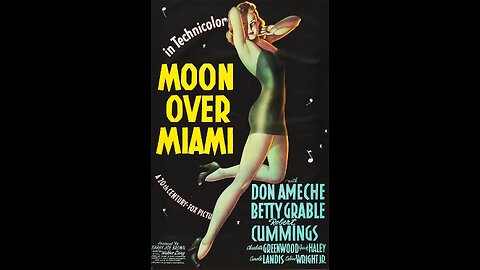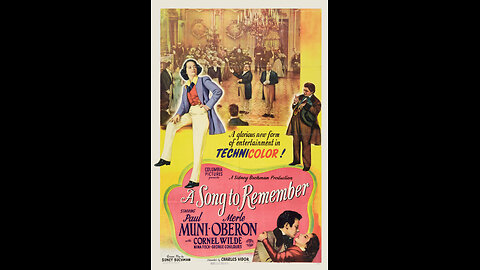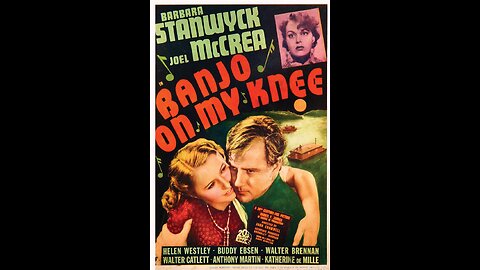
Musical Classics
36 videos
Updated 2 days ago
The Best Musicals from the Classic Era
-
In the Good Old Summertime (1949) | American musical romantic comedy directed by Robert Z. Leonard
 Classic Films & Movies Archive"In the Good Old Summertime" is a 1949 American musical romantic comedy film directed by Robert Z. Leonard. The film is a musical adaptation of the 1940 film "The Shop Around the Corner," and both films share the same source material, the play "Parfumerie" by Miklós László. The story is set in Chicago during the turn of the 20th century. Andrew Larkin, played by Van Johnson, is a mild-mannered and earnest employee at Oberkugen's music store. The store is a lively place, bustling with activity, and the film captures the spirit of the era. The plot revolves around the budding romance between Andrew and his co-worker, Veronica Fisher, portrayed by Judy Garland. Unbeknownst to both of them, they have been corresponding through anonymous love letters and are developing feelings for each other. The letters are exchanged through a classified ad in a local newspaper. Complications arise when Andrew discovers that his pen pal is none other than Veronica, his colleague with whom he often clashes in person. The film plays on the irony and humor of their situation, as the two are unaware of the identity of their secret admirers even as they work side by side. As the characters navigate their relationships, the film is punctuated by musical interludes, featuring songs such as the title track, "In the Good Old Summertime," and other nostalgic tunes of the era. The supporting cast includes characters like Mr. Oberkugen, the store owner played by S.Z. Sakall, who provides comic relief, and Marjorie Main as Andrew's aunt. The film captures the charm of a bygone era, depicting the idyllic days of summer and the innocence of romance in a simpler time. The narrative unfolds against the backdrop of the lively music store, filled with the sounds of sheet music, instruments, and the harmonies of the characters. Judy Garland (Veronica Fisher): Garland brings her signature warmth and musical talent to the role, infusing the character with charm. Van Johnson (Andrew Larkin): Johnson portrays the earnest and sometimes awkward Andrew with a mix of sincerity and humor. While not as well-remembered as the earlier versions of the story, "In the Good Old Summertime" is appreciated for its nostalgic charm, musical numbers, and the delightful chemistry between Judy Garland and Van Johnson. The film remains a classic example of the Hollywood musical genre, capturing the essence of romance and comedy against the backdrop of a bygone era.209 views
Classic Films & Movies Archive"In the Good Old Summertime" is a 1949 American musical romantic comedy film directed by Robert Z. Leonard. The film is a musical adaptation of the 1940 film "The Shop Around the Corner," and both films share the same source material, the play "Parfumerie" by Miklós László. The story is set in Chicago during the turn of the 20th century. Andrew Larkin, played by Van Johnson, is a mild-mannered and earnest employee at Oberkugen's music store. The store is a lively place, bustling with activity, and the film captures the spirit of the era. The plot revolves around the budding romance between Andrew and his co-worker, Veronica Fisher, portrayed by Judy Garland. Unbeknownst to both of them, they have been corresponding through anonymous love letters and are developing feelings for each other. The letters are exchanged through a classified ad in a local newspaper. Complications arise when Andrew discovers that his pen pal is none other than Veronica, his colleague with whom he often clashes in person. The film plays on the irony and humor of their situation, as the two are unaware of the identity of their secret admirers even as they work side by side. As the characters navigate their relationships, the film is punctuated by musical interludes, featuring songs such as the title track, "In the Good Old Summertime," and other nostalgic tunes of the era. The supporting cast includes characters like Mr. Oberkugen, the store owner played by S.Z. Sakall, who provides comic relief, and Marjorie Main as Andrew's aunt. The film captures the charm of a bygone era, depicting the idyllic days of summer and the innocence of romance in a simpler time. The narrative unfolds against the backdrop of the lively music store, filled with the sounds of sheet music, instruments, and the harmonies of the characters. Judy Garland (Veronica Fisher): Garland brings her signature warmth and musical talent to the role, infusing the character with charm. Van Johnson (Andrew Larkin): Johnson portrays the earnest and sometimes awkward Andrew with a mix of sincerity and humor. While not as well-remembered as the earlier versions of the story, "In the Good Old Summertime" is appreciated for its nostalgic charm, musical numbers, and the delightful chemistry between Judy Garland and Van Johnson. The film remains a classic example of the Hollywood musical genre, capturing the essence of romance and comedy against the backdrop of a bygone era.209 views -
Caught in the Draft (1941) | American musical comedy film directed by David Butler
 Classic Films & Movies Archive"Caught in the Draft" is a 1941 American musical comedy film directed by David Butler. Starring Bob Hope, Dorothy Lamour, and Lynne Overman, the film is a lighthearted comedy set against the backdrop of military service during World War II. The film follows the comedic misadventures of Don Bolton, played by Bob Hope, a movie star who becomes unintentionally entangled in the military draft. Don is a self-absorbed and carefree Hollywood personality who finds himself facing the prospect of compulsory military service during World War II. Desperate to avoid being drafted, Don hatches a scheme to be mistaken for a navy man by impersonating a sailor. However, his plan goes awry when he is mistakenly identified as a naval aviation cadet and is enlisted in the U.S. Navy. As Don tries to cope with military life, he encounters a tough and no-nonsense drill instructor, Sergeant McGowan, played by Lynne Overman. Meanwhile, Dorothy Lamour plays Antoinette "Tony" Fairbanks, a naval nurse who becomes romantically involved with Don. The romantic subplot adds a layer of charm and humor to the film. The comedic situations intensify as Don, unaccustomed to the discipline of military life, creates chaos in various training exercises. His bumbling antics and attempts to avoid military duty lead to a series of humorous and slapstick moments. The film incorporates musical numbers, including performances by Dorothy Lamour, and showcases Bob Hope's signature wit and comedic timing. The blend of comedy, romance, and musical elements was a popular formula during the era. Amidst the humor, the film also captures the patriotic spirit of the time, with characters embracing their roles in the war effort. The screenplay cleverly satirizes Hollywood celebrities and their interactions with the military, highlighting the contrast between the glamorous world of showbiz and the disciplined environment of military service. Bob Hope (Don Bolton): Hope delivers his trademark comedic performance, portraying the hapless and reluctant draftee with his characteristic wit. Dorothy Lamour (Antoinette "Tony" Fairbanks): Lamour adds glamour and musical talent to the film, playing the romantic interest of Bob Hope's character. Lynne Overman (Sergeant McGowan): Overman provides comic relief as the tough drill instructor who has to deal with the antics of the Hollywood star. "Caught in the Draft" is a representative example of the wartime comedies produced during the 1940s. Bob Hope's comedic style, combined with the film's blend of humor, romance, and music, made it a popular and entertaining release during a time when audiences sought light-hearted entertainment amidst the challenges of war.228 views
Classic Films & Movies Archive"Caught in the Draft" is a 1941 American musical comedy film directed by David Butler. Starring Bob Hope, Dorothy Lamour, and Lynne Overman, the film is a lighthearted comedy set against the backdrop of military service during World War II. The film follows the comedic misadventures of Don Bolton, played by Bob Hope, a movie star who becomes unintentionally entangled in the military draft. Don is a self-absorbed and carefree Hollywood personality who finds himself facing the prospect of compulsory military service during World War II. Desperate to avoid being drafted, Don hatches a scheme to be mistaken for a navy man by impersonating a sailor. However, his plan goes awry when he is mistakenly identified as a naval aviation cadet and is enlisted in the U.S. Navy. As Don tries to cope with military life, he encounters a tough and no-nonsense drill instructor, Sergeant McGowan, played by Lynne Overman. Meanwhile, Dorothy Lamour plays Antoinette "Tony" Fairbanks, a naval nurse who becomes romantically involved with Don. The romantic subplot adds a layer of charm and humor to the film. The comedic situations intensify as Don, unaccustomed to the discipline of military life, creates chaos in various training exercises. His bumbling antics and attempts to avoid military duty lead to a series of humorous and slapstick moments. The film incorporates musical numbers, including performances by Dorothy Lamour, and showcases Bob Hope's signature wit and comedic timing. The blend of comedy, romance, and musical elements was a popular formula during the era. Amidst the humor, the film also captures the patriotic spirit of the time, with characters embracing their roles in the war effort. The screenplay cleverly satirizes Hollywood celebrities and their interactions with the military, highlighting the contrast between the glamorous world of showbiz and the disciplined environment of military service. Bob Hope (Don Bolton): Hope delivers his trademark comedic performance, portraying the hapless and reluctant draftee with his characteristic wit. Dorothy Lamour (Antoinette "Tony" Fairbanks): Lamour adds glamour and musical talent to the film, playing the romantic interest of Bob Hope's character. Lynne Overman (Sergeant McGowan): Overman provides comic relief as the tough drill instructor who has to deal with the antics of the Hollywood star. "Caught in the Draft" is a representative example of the wartime comedies produced during the 1940s. Bob Hope's comedic style, combined with the film's blend of humor, romance, and music, made it a popular and entertaining release during a time when audiences sought light-hearted entertainment amidst the challenges of war.228 views -
Kentucky Jubilee (1951) | Directed by Ron Ormond
 Classic Films & Movies ArchiveKentucky Jubilee is a musical comedy with elements of mystery, set in a small Southern town known for its annual country fair and talent show. The story follows a group of entertainers and a visiting reporter who find themselves entangled in a bizarre crime when a prominent citizen is kidnapped. As they navigate quirky townsfolk, musical performances, and comedic mishaps, the characters must uncover the truth while ensuring the jubilee goes on as planned. The film blends country-style humor with lively musical numbers, capturing the charm of early 1950s rural America. Genre: Musical, Comedy, Mystery Director: Ron Ormond Ron Ormond was a filmmaker known for his work in low-budget Westerns, exploitation films, and later, religious cinema. With a career spanning from the 1940s to the 1970s, he specialized in quickly produced, crowd-pleasing films that often featured country music stars and action-packed plots. His ability to blend humor, music, and suspense made him a staple in independent filmmaking, though his work was often regarded as campy by modern audiences. Star Cast: - Jerry Collona as Jerry Harris - Jean Porter as Gloria Pelley - James Ellison as Jeff Benson - Zeba Ray as Lulubelle - Chill Wills as Sheriff Horne Kentucky Jubilee was received as lighthearted entertainment, particularly appealing to fans of country music and Southern comedy. Critics noted its simplistic plot and low-budget production values but acknowledged its appeal to audiences who enjoyed rural-themed musicals. The presence of well-known character actors like Jerry Collona and Chill Wills added to the film’s comedic charm. Though not a major hit, it found an audience among fans of small-town Americana films and live-performance showcases. Over time, it has become a nostalgic relic of mid-century musical comedy. Fun Facts: - The film prominently features real country music acts, making it a showcase for emerging talent in the 1950s. - Jerry Collona, known for his comedic persona and exaggerated expressions, brought his signature humor to the film, making it one of the more memorable aspects. - Chill Wills, a veteran character actor, was well-known for playing Western and Southern authority figures, adding a familiar presence to the cast. - The movie’s title references the real-life tradition of state fairs and talent showcases that were popular in mid-century America. - Kentucky Jubilee was one of several films of the era that combined musical performances with light mystery elements, a trend common in lower-budget productions.115 views
Classic Films & Movies ArchiveKentucky Jubilee is a musical comedy with elements of mystery, set in a small Southern town known for its annual country fair and talent show. The story follows a group of entertainers and a visiting reporter who find themselves entangled in a bizarre crime when a prominent citizen is kidnapped. As they navigate quirky townsfolk, musical performances, and comedic mishaps, the characters must uncover the truth while ensuring the jubilee goes on as planned. The film blends country-style humor with lively musical numbers, capturing the charm of early 1950s rural America. Genre: Musical, Comedy, Mystery Director: Ron Ormond Ron Ormond was a filmmaker known for his work in low-budget Westerns, exploitation films, and later, religious cinema. With a career spanning from the 1940s to the 1970s, he specialized in quickly produced, crowd-pleasing films that often featured country music stars and action-packed plots. His ability to blend humor, music, and suspense made him a staple in independent filmmaking, though his work was often regarded as campy by modern audiences. Star Cast: - Jerry Collona as Jerry Harris - Jean Porter as Gloria Pelley - James Ellison as Jeff Benson - Zeba Ray as Lulubelle - Chill Wills as Sheriff Horne Kentucky Jubilee was received as lighthearted entertainment, particularly appealing to fans of country music and Southern comedy. Critics noted its simplistic plot and low-budget production values but acknowledged its appeal to audiences who enjoyed rural-themed musicals. The presence of well-known character actors like Jerry Collona and Chill Wills added to the film’s comedic charm. Though not a major hit, it found an audience among fans of small-town Americana films and live-performance showcases. Over time, it has become a nostalgic relic of mid-century musical comedy. Fun Facts: - The film prominently features real country music acts, making it a showcase for emerging talent in the 1950s. - Jerry Collona, known for his comedic persona and exaggerated expressions, brought his signature humor to the film, making it one of the more memorable aspects. - Chill Wills, a veteran character actor, was well-known for playing Western and Southern authority figures, adding a familiar presence to the cast. - The movie’s title references the real-life tradition of state fairs and talent showcases that were popular in mid-century America. - Kentucky Jubilee was one of several films of the era that combined musical performances with light mystery elements, a trend common in lower-budget productions.115 views -
The Girl Next Door (1953) | American musical comedy film directed by Richard Sale
 Classic Films & Movies Archive"The Girl Next Door" is a 1953 American musical comedy film directed by Richard Sale. The film is a lighthearted romantic comedy that features the talents of popular performers of the time. The film centers around Dan Dailey, who plays Dan Carter, a successful songwriter and performer. One day, while taking a stroll through the neighborhood, he encounters a group of children putting on a lemonade stand. Among them is a young girl named Mariette Larkin, played by June Haver. Mariette is not just any girl; she is an aspiring singer with dreams of making it big in show business. Dan recognizes her talent and decides to help her achieve her ambitions. He offers to become her mentor and guide her through the challenges of the entertainment industry. As Mariette begins her journey in the world of showbiz, she faces various obstacles and adventures. The film incorporates musical numbers and comedic sequences as Mariette navigates auditions, performances, and the ups and downs of trying to make a mark in the competitive world of entertainment. Dan and Mariette's professional relationship gradually develops into a romantic one, adding a layer of romantic tension to the story. The film explores themes of mentorship, friendship, and the pursuit of dreams, all set against a backdrop of lively musical performances. The supporting cast includes familiar faces of the era, contributing to the film's entertainment value. Gene Nelson plays a significant role as Mariette's love interest, adding a romantic subplot to the narrative. Dan Dailey (Dan Carter): Dailey brings his charm and musical talent to the role of the experienced songwriter and mentor. June Haver (Mariette Larkin): Haver portrays the aspiring young singer with enthusiasm, capturing the spirit of a hopeful talent looking for a break. "The Girl Next Door" is a product of the musical and romantic comedy trends of the 1950s. While it may not be as widely remembered as some other films of the era, it contributes to the cinematic landscape of light-hearted entertainment featuring popular stars of the time. The film's focus on mentorship and the pursuit of dreams, set within the framework of a musical comedy, adds to its appeal for fans of classic Hollywood cinema.196 views
Classic Films & Movies Archive"The Girl Next Door" is a 1953 American musical comedy film directed by Richard Sale. The film is a lighthearted romantic comedy that features the talents of popular performers of the time. The film centers around Dan Dailey, who plays Dan Carter, a successful songwriter and performer. One day, while taking a stroll through the neighborhood, he encounters a group of children putting on a lemonade stand. Among them is a young girl named Mariette Larkin, played by June Haver. Mariette is not just any girl; she is an aspiring singer with dreams of making it big in show business. Dan recognizes her talent and decides to help her achieve her ambitions. He offers to become her mentor and guide her through the challenges of the entertainment industry. As Mariette begins her journey in the world of showbiz, she faces various obstacles and adventures. The film incorporates musical numbers and comedic sequences as Mariette navigates auditions, performances, and the ups and downs of trying to make a mark in the competitive world of entertainment. Dan and Mariette's professional relationship gradually develops into a romantic one, adding a layer of romantic tension to the story. The film explores themes of mentorship, friendship, and the pursuit of dreams, all set against a backdrop of lively musical performances. The supporting cast includes familiar faces of the era, contributing to the film's entertainment value. Gene Nelson plays a significant role as Mariette's love interest, adding a romantic subplot to the narrative. Dan Dailey (Dan Carter): Dailey brings his charm and musical talent to the role of the experienced songwriter and mentor. June Haver (Mariette Larkin): Haver portrays the aspiring young singer with enthusiasm, capturing the spirit of a hopeful talent looking for a break. "The Girl Next Door" is a product of the musical and romantic comedy trends of the 1950s. While it may not be as widely remembered as some other films of the era, it contributes to the cinematic landscape of light-hearted entertainment featuring popular stars of the time. The film's focus on mentorship and the pursuit of dreams, set within the framework of a musical comedy, adds to its appeal for fans of classic Hollywood cinema.196 views -
Road Show (1941) | Directed by Hal Roach
 Classic Films & Movies Archive"Road Show" (1941) is a lively and entertaining musical comedy that takes audiences on a rollicking journey through the world of show business. Directed by Hal Roach, this film captures the glamour and chaos of the theatrical circuit with a delightful blend of humor, music, and romance. The plot revolves around a struggling traveling theatrical troupe led by producer S.B. Bellows, portrayed by Adolphe Menjou. In a stroke of luck, they come across a talented singer, played by Carole Landis, whose arrival brings both excitement and romantic entanglements to the group. As the troupe faces the challenges of the road, from financial struggles to romantic misadventures, "Road Show" unfolds as a delightful and heartwarming tale. The film features a dynamic cast, including the charismatic John Hubbard and Patsy Kelly, whose comedic timing adds to the lighthearted atmosphere. With musical numbers, comedic escapades, and a touch of romance, "Road Show" offers a captivating snapshot of the ups and downs of life on the road in the entertainment industry. Hal Roach's direction brings out the best in the ensemble cast, and the film's energetic pace keeps audiences engaged from start to finish. The lively musical sequences, coupled with the comedic interactions between characters, make "Road Show" a delightful cinematic experience that captures the spirit of the era's musical comedies. Step right up for a grand entertainment extravaganza with "Road Show," a classic musical comedy that celebrates the charm and chaos of the traveling showbiz world. With its catchy tunes, sparkling performances, and a healthy dose of humor, this film remains a timeless and joyful addition to the annals of Hollywood's golden age.64 views
Classic Films & Movies Archive"Road Show" (1941) is a lively and entertaining musical comedy that takes audiences on a rollicking journey through the world of show business. Directed by Hal Roach, this film captures the glamour and chaos of the theatrical circuit with a delightful blend of humor, music, and romance. The plot revolves around a struggling traveling theatrical troupe led by producer S.B. Bellows, portrayed by Adolphe Menjou. In a stroke of luck, they come across a talented singer, played by Carole Landis, whose arrival brings both excitement and romantic entanglements to the group. As the troupe faces the challenges of the road, from financial struggles to romantic misadventures, "Road Show" unfolds as a delightful and heartwarming tale. The film features a dynamic cast, including the charismatic John Hubbard and Patsy Kelly, whose comedic timing adds to the lighthearted atmosphere. With musical numbers, comedic escapades, and a touch of romance, "Road Show" offers a captivating snapshot of the ups and downs of life on the road in the entertainment industry. Hal Roach's direction brings out the best in the ensemble cast, and the film's energetic pace keeps audiences engaged from start to finish. The lively musical sequences, coupled with the comedic interactions between characters, make "Road Show" a delightful cinematic experience that captures the spirit of the era's musical comedies. Step right up for a grand entertainment extravaganza with "Road Show," a classic musical comedy that celebrates the charm and chaos of the traveling showbiz world. With its catchy tunes, sparkling performances, and a healthy dose of humor, this film remains a timeless and joyful addition to the annals of Hollywood's golden age.64 views -
Moon Over Miami (1941) | Directed by Walter Lang
 Classic Films & Movies Archive"Moon Over Miami" (1941) is a delightful musical romantic comedy directed by Walter Lang that transports audiences to the sun-soaked glamour of Miami during the golden age of Hollywood. Starring Betty Grable and Don Ameche, this vibrant and entertaining film captures the spirit of escapism with its catchy tunes, sparkling performances, and a dose of romantic charm. The plot revolves around two sisters, played by Betty Grable and Carole Landis, who travel to Miami in search of wealthy suitors. Mistaken identities and romantic entanglements ensue as the sisters navigate the glamorous social scene, accompanied by the suave businessman Phil O'Neil, portrayed by Don Ameche. As the characters embark on a series of comedic misadventures, the film unfolds as a lighthearted romp through love and laughter. "Moon Over Miami" is renowned for its catchy musical numbers, including the hit song "You Started Something," performed by Betty Grable. The film's vivacious energy and Technicolor splendor contribute to its enduring popularity as a quintessential example of the escapist musicals of the era. Walter Lang's direction brings out the best in the ensemble cast, and the film's glamorous visuals showcase the allure of Miami as a backdrop for romance and comedy. With its infectious charm and feel-good atmosphere, "Moon Over Miami" remains a beloved classic that continues to captivate audiences with its timeless appeal. Escape to the enchanting world of romance, music, and Miami glamour with "Moon Over Miami." This musical gem is a testament to the magic of classic Hollywood musicals, providing a nostalgic and entertaining journey into the bygone era of cinematic splendor.101 views
Classic Films & Movies Archive"Moon Over Miami" (1941) is a delightful musical romantic comedy directed by Walter Lang that transports audiences to the sun-soaked glamour of Miami during the golden age of Hollywood. Starring Betty Grable and Don Ameche, this vibrant and entertaining film captures the spirit of escapism with its catchy tunes, sparkling performances, and a dose of romantic charm. The plot revolves around two sisters, played by Betty Grable and Carole Landis, who travel to Miami in search of wealthy suitors. Mistaken identities and romantic entanglements ensue as the sisters navigate the glamorous social scene, accompanied by the suave businessman Phil O'Neil, portrayed by Don Ameche. As the characters embark on a series of comedic misadventures, the film unfolds as a lighthearted romp through love and laughter. "Moon Over Miami" is renowned for its catchy musical numbers, including the hit song "You Started Something," performed by Betty Grable. The film's vivacious energy and Technicolor splendor contribute to its enduring popularity as a quintessential example of the escapist musicals of the era. Walter Lang's direction brings out the best in the ensemble cast, and the film's glamorous visuals showcase the allure of Miami as a backdrop for romance and comedy. With its infectious charm and feel-good atmosphere, "Moon Over Miami" remains a beloved classic that continues to captivate audiences with its timeless appeal. Escape to the enchanting world of romance, music, and Miami glamour with "Moon Over Miami." This musical gem is a testament to the magic of classic Hollywood musicals, providing a nostalgic and entertaining journey into the bygone era of cinematic splendor.101 views -
The Little Colonel (1935) | Directed by David Butler
 Classic Films & Movies Archive"The Little Colonel" is a 1935 American musical comedy-drama film directed by David Butler. This heartwarming family film is notable for its charming storyline, musical numbers, and the breakthrough performance of its young star, Shirley Temple. Starring Shirley Temple as the adorable and spunky Lloyd Sherman, "The Little Colonel" follows the story of a young girl who brings together her estranged, Southern aristocratic grandfather, Colonel Lloyd (played by Lionel Barrymore), and her Northern-bred mother, Elizabeth (played by Evelyn Venable). The film unfolds in a delightful manner, combining elements of comedy, drama, and musical performances. Shirley Temple's endearing portrayal of the titular character, along with her signature song-and-dance routines, contributed significantly to the film's success. Lionel Barrymore's performance as the initially stern but eventually warm-hearted Colonel adds depth to the narrative, and Evelyn Venable complements the cast as the understanding and determined mother. Upon its release, "The Little Colonel" received positive reviews for its engaging narrative, Temple's charismatic screen presence, and the overall family-friendly atmosphere. Audiences were captivated by Shirley Temple's talent and undeniable charm, turning her into a beloved child star of the era. The film's success led to Temple's further prominence in Hollywood and solidified her status as America's sweetheart. "The Little Colonel" remains a nostalgic classic, cherished for its innocence, humor, and the timeless appeal of Shirley Temple. It continues to be celebrated as a quintessential family film from the Golden Age of Hollywood, providing audiences with a delightful escape into a world of heartwarming storytelling and musical entertainment.125 views
Classic Films & Movies Archive"The Little Colonel" is a 1935 American musical comedy-drama film directed by David Butler. This heartwarming family film is notable for its charming storyline, musical numbers, and the breakthrough performance of its young star, Shirley Temple. Starring Shirley Temple as the adorable and spunky Lloyd Sherman, "The Little Colonel" follows the story of a young girl who brings together her estranged, Southern aristocratic grandfather, Colonel Lloyd (played by Lionel Barrymore), and her Northern-bred mother, Elizabeth (played by Evelyn Venable). The film unfolds in a delightful manner, combining elements of comedy, drama, and musical performances. Shirley Temple's endearing portrayal of the titular character, along with her signature song-and-dance routines, contributed significantly to the film's success. Lionel Barrymore's performance as the initially stern but eventually warm-hearted Colonel adds depth to the narrative, and Evelyn Venable complements the cast as the understanding and determined mother. Upon its release, "The Little Colonel" received positive reviews for its engaging narrative, Temple's charismatic screen presence, and the overall family-friendly atmosphere. Audiences were captivated by Shirley Temple's talent and undeniable charm, turning her into a beloved child star of the era. The film's success led to Temple's further prominence in Hollywood and solidified her status as America's sweetheart. "The Little Colonel" remains a nostalgic classic, cherished for its innocence, humor, and the timeless appeal of Shirley Temple. It continues to be celebrated as a quintessential family film from the Golden Age of Hollywood, providing audiences with a delightful escape into a world of heartwarming storytelling and musical entertainment.125 views -
A Ticket to Tomahawk (1950) | Directed by Richard Sale
 Classic Films & Movies Archive"A Ticket to Tomahawk" is a 1950 Western musical comedy film directed by Richard Sale. Although Marilyn Monroe is often associated with the film due to her brief appearance in a bit part, it's important to note that her role is relatively minor, and she wasn't a lead character. In "A Ticket to Tomahawk," the story unfolds in the small Colorado town of Denver Junction, where the railroad is the lifeline connecting the community. The film follows the quirky adventures and misadventures of various characters, including a singing cowboy portrayed by Dan Dailey. As the town gears up for a grand celebration, complete with a train race and musical numbers, chaos ensues. Marilyn Monroe makes a brief but memorable appearance in a small role, showcasing her early talent before becoming a Hollywood icon. - Dan Dailey as Johnny James - Anne Baxter as Kit Dodge Jr. - Rory Calhoun as Dakota - Walter Brennan as Judge Ben Clyborne - Marilyn Monroe in a minor role "A Ticket to Tomahawk" received a generally positive response for its lighthearted and comedic take on the Western genre. Audiences appreciated the musical elements, and the film contributed to Marilyn Monroe's rising popularity, even though her role was relatively small. The film is remembered as a charming and entertaining piece of 1950s cinema, showcasing a blend of comedy, music, and Western adventure. It's worth noting that Marilyn Monroe's career continued to soar after "A Ticket to Tomahawk," leading to her eventual status as one of the most iconic figures in the history of cinema.104 views
Classic Films & Movies Archive"A Ticket to Tomahawk" is a 1950 Western musical comedy film directed by Richard Sale. Although Marilyn Monroe is often associated with the film due to her brief appearance in a bit part, it's important to note that her role is relatively minor, and she wasn't a lead character. In "A Ticket to Tomahawk," the story unfolds in the small Colorado town of Denver Junction, where the railroad is the lifeline connecting the community. The film follows the quirky adventures and misadventures of various characters, including a singing cowboy portrayed by Dan Dailey. As the town gears up for a grand celebration, complete with a train race and musical numbers, chaos ensues. Marilyn Monroe makes a brief but memorable appearance in a small role, showcasing her early talent before becoming a Hollywood icon. - Dan Dailey as Johnny James - Anne Baxter as Kit Dodge Jr. - Rory Calhoun as Dakota - Walter Brennan as Judge Ben Clyborne - Marilyn Monroe in a minor role "A Ticket to Tomahawk" received a generally positive response for its lighthearted and comedic take on the Western genre. Audiences appreciated the musical elements, and the film contributed to Marilyn Monroe's rising popularity, even though her role was relatively small. The film is remembered as a charming and entertaining piece of 1950s cinema, showcasing a blend of comedy, music, and Western adventure. It's worth noting that Marilyn Monroe's career continued to soar after "A Ticket to Tomahawk," leading to her eventual status as one of the most iconic figures in the history of cinema.104 views -
A Song to Remember (1945) | Directed by Charles Vidor
 Classic Films & Movies Archive"A Song to Remember" (1945) is a musical biopic that delves into the life of the renowned composer Frédéric Chopin. Starring Paul Muni as Chopin, Merle Oberon as George Sand, and Cornel Wilde as the young student, this film explores the passionate and tumultuous relationship between Chopin and Sand, a French novelist. The film traces Chopin's journey from his early days in Poland to his success as a celebrated composer in Paris. It vividly captures the artistic brilliance of Chopin's musical creations, bringing his compositions to life through breathtaking performances. The romantic subplot involving Oberon's portrayal of George Sand adds depth to the narrative, portraying the complex dynamics of love and creativity. Upon its release, "A Song to Remember" received positive acclaim for its lush musical sequences, powerful performances, and captivating storytelling. Paul Muni's portrayal of Chopin was particularly praised for its depth and emotional resonance. While some liberties were taken with historical accuracy, the film successfully captures the essence of Chopin's artistry and the passionate era in which he lived. Overall, "A Song to Remember" stands as a tribute to the enduring legacy of Frédéric Chopin, offering audiences a visually and musically enchanting cinematic experience.126 views
Classic Films & Movies Archive"A Song to Remember" (1945) is a musical biopic that delves into the life of the renowned composer Frédéric Chopin. Starring Paul Muni as Chopin, Merle Oberon as George Sand, and Cornel Wilde as the young student, this film explores the passionate and tumultuous relationship between Chopin and Sand, a French novelist. The film traces Chopin's journey from his early days in Poland to his success as a celebrated composer in Paris. It vividly captures the artistic brilliance of Chopin's musical creations, bringing his compositions to life through breathtaking performances. The romantic subplot involving Oberon's portrayal of George Sand adds depth to the narrative, portraying the complex dynamics of love and creativity. Upon its release, "A Song to Remember" received positive acclaim for its lush musical sequences, powerful performances, and captivating storytelling. Paul Muni's portrayal of Chopin was particularly praised for its depth and emotional resonance. While some liberties were taken with historical accuracy, the film successfully captures the essence of Chopin's artistry and the passionate era in which he lived. Overall, "A Song to Remember" stands as a tribute to the enduring legacy of Frédéric Chopin, offering audiences a visually and musically enchanting cinematic experience.126 views -
Banjo on My Knee (1936) | Directed by John Cromwell
 Classic Films & Movies Archive"Banjo on My Knee" (1936) takes audiences on a captivating journey through the colorful and lively world of the American South during the post-Civil War era. Starring the charismatic duo of Barbara Stanwyck and Joel McCrea, this musical drama weaves a tale of love, resilience, and the transformative power of music. Barbara Stanwyck portrays the spirited and determined Pearl, a young woman with dreams as vast as the Mississippi River. She is joined by Joel McCrea, who plays Ernie, a talented musician with a banjo and a heart full of passion. The chemistry between Stanwyck and McCrea brings the characters to life, making their journey from the bayous to the big stage a captivating and heartwarming experience. As Pearl and Ernie navigate the challenges of life in the South, their love story unfolds against a backdrop of soul-stirring musical performances. The banjo, a central motif in the film, becomes not only a musical instrument but also a symbol of resilience and hope. The film showcases the power of music to bridge divides, heal wounds, and uplift the human spirit. "Banjo on My Knee" received acclaim from audiences and critics alike for its engaging narrative, memorable musical sequences, and the magnetic performances of Barbara Stanwyck and Joel McCrea. The film's portrayal of Southern culture, combined with its exploration of love and determination, struck a chord with viewers of the time. The musical numbers, featuring toe-tapping tunes and heartfelt lyrics, became particularly popular, contributing to the film's success. Stanwyck and McCrea's on-screen chemistry was praised, adding depth and authenticity to their characters' journey. The film's depiction of Southern landscapes, music halls, and the vibrant atmosphere of the era resonated with audiences looking for both entertainment and a glimpse into a bygone era. "Banjo on My Knee" remains a testament to the enduring appeal of classic Hollywood cinema, blending romance, music, and drama in a way that continues to captivate audiences, even decades after its initial release.69 views
Classic Films & Movies Archive"Banjo on My Knee" (1936) takes audiences on a captivating journey through the colorful and lively world of the American South during the post-Civil War era. Starring the charismatic duo of Barbara Stanwyck and Joel McCrea, this musical drama weaves a tale of love, resilience, and the transformative power of music. Barbara Stanwyck portrays the spirited and determined Pearl, a young woman with dreams as vast as the Mississippi River. She is joined by Joel McCrea, who plays Ernie, a talented musician with a banjo and a heart full of passion. The chemistry between Stanwyck and McCrea brings the characters to life, making their journey from the bayous to the big stage a captivating and heartwarming experience. As Pearl and Ernie navigate the challenges of life in the South, their love story unfolds against a backdrop of soul-stirring musical performances. The banjo, a central motif in the film, becomes not only a musical instrument but also a symbol of resilience and hope. The film showcases the power of music to bridge divides, heal wounds, and uplift the human spirit. "Banjo on My Knee" received acclaim from audiences and critics alike for its engaging narrative, memorable musical sequences, and the magnetic performances of Barbara Stanwyck and Joel McCrea. The film's portrayal of Southern culture, combined with its exploration of love and determination, struck a chord with viewers of the time. The musical numbers, featuring toe-tapping tunes and heartfelt lyrics, became particularly popular, contributing to the film's success. Stanwyck and McCrea's on-screen chemistry was praised, adding depth and authenticity to their characters' journey. The film's depiction of Southern landscapes, music halls, and the vibrant atmosphere of the era resonated with audiences looking for both entertainment and a glimpse into a bygone era. "Banjo on My Knee" remains a testament to the enduring appeal of classic Hollywood cinema, blending romance, music, and drama in a way that continues to captivate audiences, even decades after its initial release.69 views
